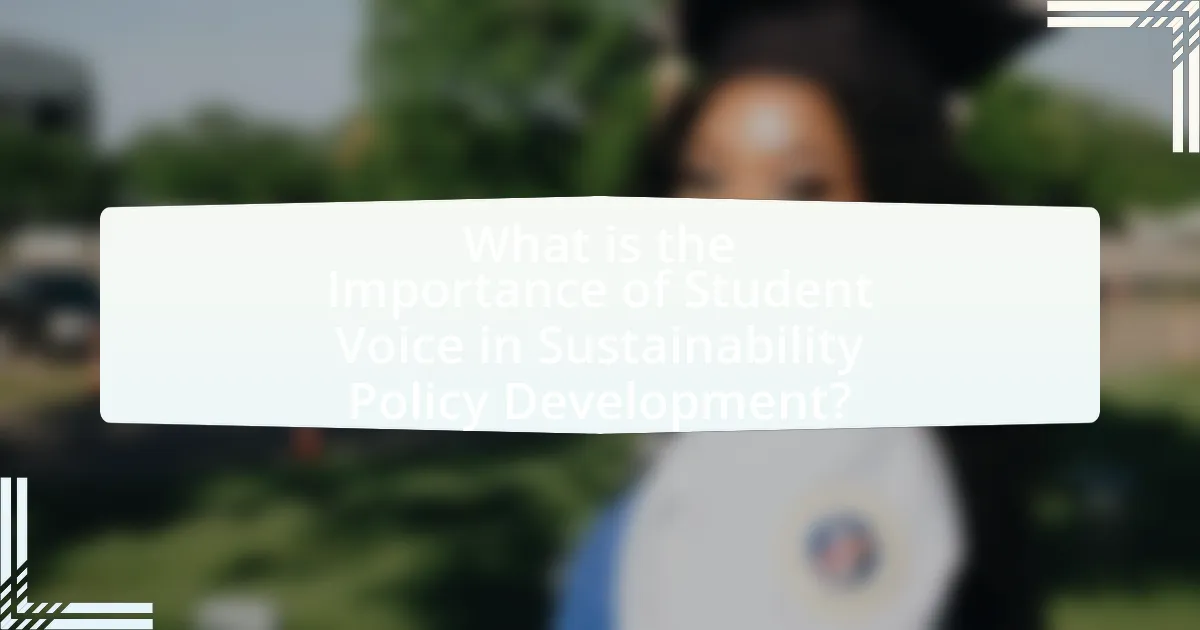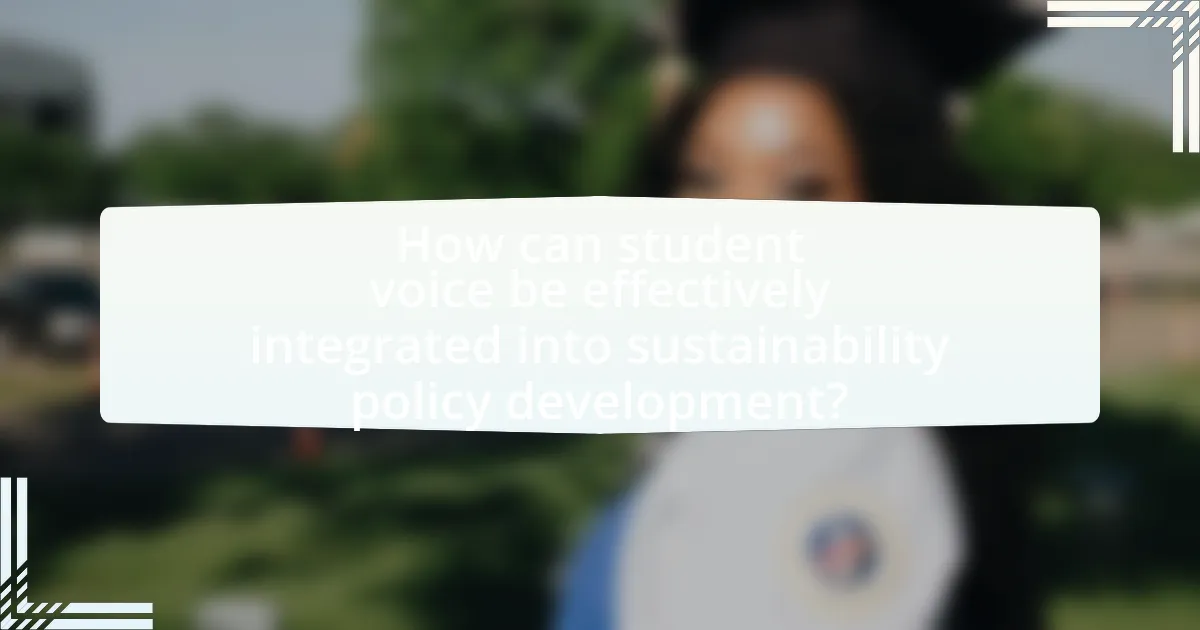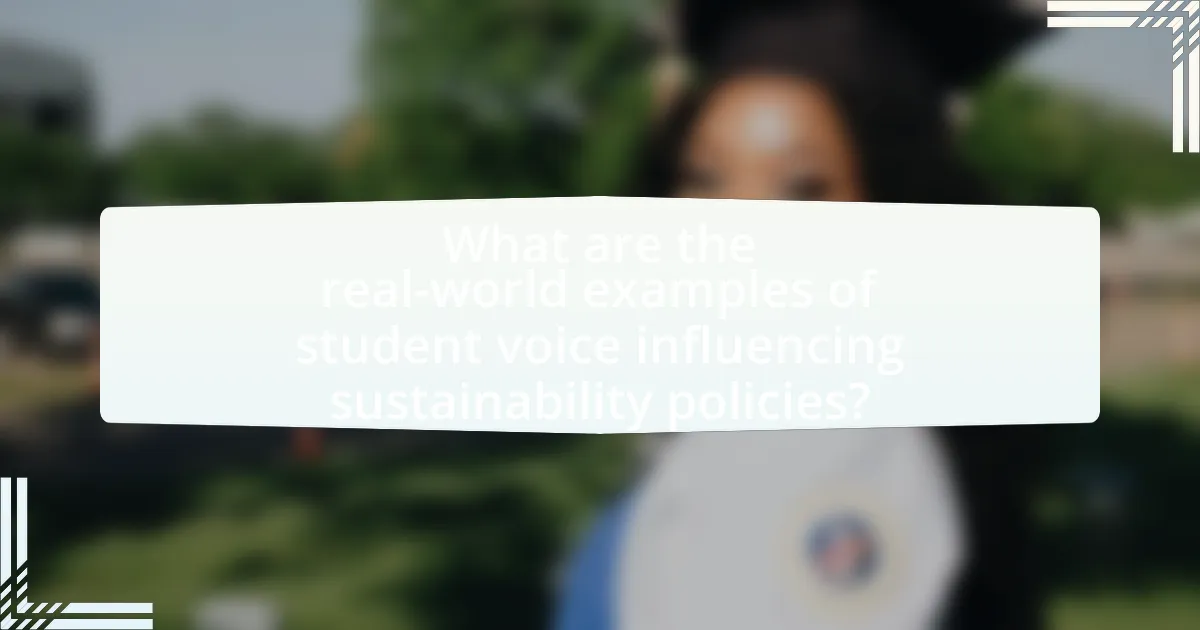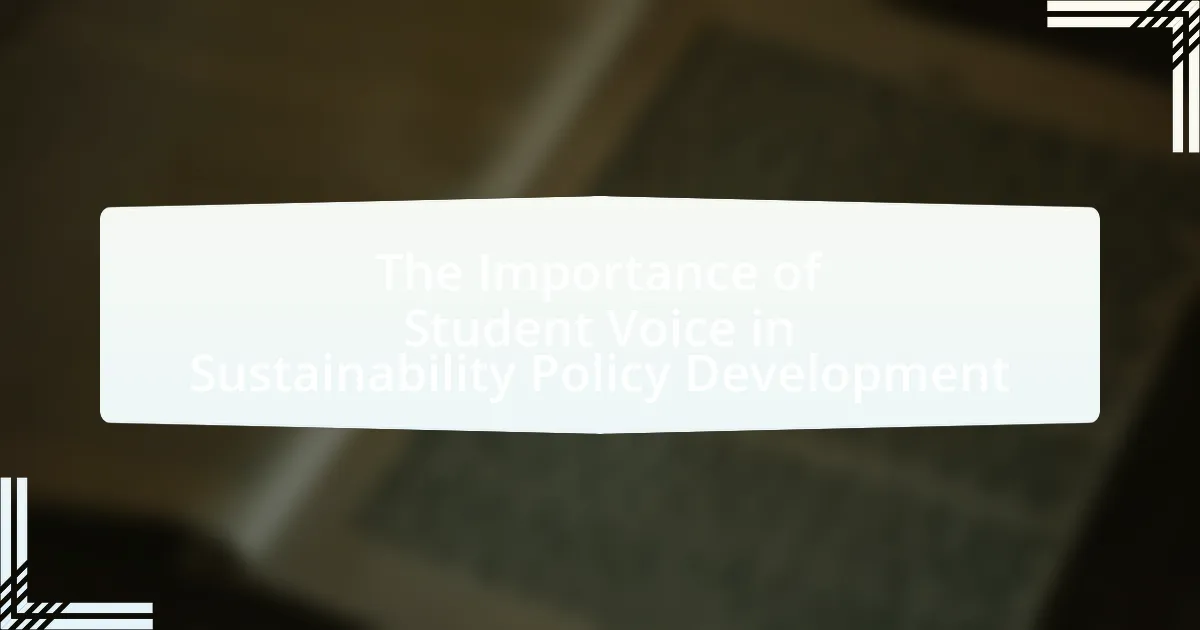The article focuses on the significance of student voice in the development of sustainability policies. It highlights how engaging students in policy discussions fosters inclusive decision-making, leading to more effective and relevant outcomes that reflect the needs of younger generations. The article discusses the role of students in shaping sustainability policies through advocacy and activism, the benefits of their involvement, and the strategies for integrating their perspectives into policy development. Additionally, it addresses the challenges faced in this integration and provides real-world examples of successful student engagement in sustainability initiatives, emphasizing the importance of collaboration and feedback mechanisms for ongoing student input.

What is the Importance of Student Voice in Sustainability Policy Development?
The importance of student voice in sustainability policy development lies in its ability to foster inclusive decision-making and ensure that policies reflect the needs and perspectives of the younger generation. Engaging students in this process encourages the incorporation of innovative ideas and solutions that are relevant to their experiences and future. Research indicates that when students participate in policy discussions, it leads to more effective and sustainable outcomes, as evidenced by studies showing that schools with active student involvement in environmental initiatives report higher levels of engagement and success in sustainability efforts. This active participation not only empowers students but also cultivates a sense of responsibility and ownership over environmental issues, ultimately contributing to more robust and effective sustainability policies.
Why is student voice crucial in sustainability discussions?
Student voice is crucial in sustainability discussions because it ensures that the perspectives and needs of younger generations are represented in decision-making processes. Engaging students allows for the incorporation of innovative ideas and solutions that reflect their unique experiences and concerns regarding environmental issues. Research indicates that when students participate in sustainability initiatives, such as the “Youth Climate Summit” organized by the United Nations, they contribute valuable insights that can lead to more effective and inclusive policies. This involvement not only empowers students but also fosters a sense of responsibility and ownership over sustainability efforts, ultimately leading to more sustainable outcomes.
What role do students play in shaping sustainability policies?
Students play a crucial role in shaping sustainability policies by advocating for environmental issues and influencing decision-makers through activism and participation in policy discussions. Their engagement often leads to the incorporation of innovative ideas and perspectives that reflect the values and concerns of younger generations. For instance, student-led movements, such as the global climate strikes initiated by Greta Thunberg, have garnered significant media attention and prompted policymakers to prioritize climate action. Additionally, research from the University of California, Berkeley, indicates that student involvement in sustainability initiatives on campuses has led to the implementation of more effective and inclusive environmental policies. This demonstrates that students not only contribute to the dialogue surrounding sustainability but also drive tangible changes in policy frameworks.
How does student engagement influence policy outcomes?
Student engagement significantly influences policy outcomes by ensuring that the perspectives and needs of students are considered in decision-making processes. When students actively participate in discussions and advocacy related to sustainability policies, they can provide valuable insights that reflect their experiences and priorities. Research indicates that policies developed with student input are more likely to address relevant issues and gain broader support, as seen in initiatives like the University of California’s Student Sustainability Coalition, which successfully influenced campus sustainability policies through student-led advocacy. This demonstrates that engaged students can drive meaningful changes in policy by articulating their concerns and proposing solutions that resonate with their communities.
What are the key benefits of incorporating student voice in sustainability policy?
Incorporating student voice in sustainability policy enhances engagement, fosters innovation, and ensures policies reflect the needs and values of the student body. Engaged students are more likely to participate in sustainability initiatives, leading to higher rates of implementation and success. Research indicates that when students contribute to policy development, they bring fresh perspectives and creative solutions, which can improve the effectiveness of sustainability efforts. For example, a study by the National Wildlife Federation found that schools that actively involved students in environmental decision-making saw a 30% increase in student participation in sustainability programs. This demonstrates that student involvement not only enriches policy but also drives meaningful action towards sustainability goals.
How does student input enhance the relevance of sustainability policies?
Student input enhances the relevance of sustainability policies by ensuring that these policies reflect the values, concerns, and innovative ideas of the younger generation. Engaging students in the policy-making process allows for the incorporation of fresh perspectives and practical solutions that resonate with their experiences and aspirations. Research indicates that when students participate in sustainability initiatives, such as the “Youth Climate Summit” organized by the United Nations, their contributions lead to more effective and widely accepted policies. This involvement not only fosters a sense of ownership among students but also aligns sustainability efforts with the priorities of future leaders, ultimately increasing the likelihood of successful implementation and long-term impact.
What impact does student participation have on community awareness and action?
Student participation significantly enhances community awareness and action by fostering engagement and promoting informed decision-making. When students actively participate in community initiatives, they bring fresh perspectives and innovative ideas that can address local issues effectively. Research indicates that student-led projects, such as environmental clean-ups or awareness campaigns, not only educate peers but also mobilize community members, leading to increased participation in sustainability efforts. For instance, a study published in the Journal of Environmental Education found that student involvement in local environmental projects resulted in a 30% increase in community participation in sustainability initiatives. This demonstrates that student engagement is a catalyst for broader community action and awareness.

How can student voice be effectively integrated into sustainability policy development?
Student voice can be effectively integrated into sustainability policy development by establishing structured platforms for student engagement, such as advisory committees or focus groups. These platforms allow students to share their perspectives and ideas directly with policymakers, ensuring their insights are considered in decision-making processes. Research indicates that when students participate in policy discussions, it leads to more relevant and impactful sustainability initiatives, as evidenced by the 2021 study published in the Journal of Environmental Education, which found that schools with active student involvement in sustainability policies reported a 30% increase in successful implementation of green initiatives.
What strategies can be employed to amplify student voice?
To amplify student voice, educational institutions can implement strategies such as creating student advisory boards, integrating student feedback mechanisms, and fostering collaborative projects between students and faculty. Student advisory boards allow students to participate in decision-making processes, ensuring their perspectives are considered in policy development. Feedback mechanisms, such as surveys and suggestion boxes, provide students with platforms to express their opinions and influence changes. Collaborative projects, where students work alongside faculty on sustainability initiatives, empower students to take ownership of their learning and contribute meaningfully to policy discussions. These strategies have been shown to enhance engagement and lead to more inclusive and effective sustainability policies in educational settings.
How can educational institutions facilitate student participation?
Educational institutions can facilitate student participation by creating structured opportunities for engagement, such as student councils, focus groups, and participatory decision-making processes. These platforms allow students to express their opinions and contribute to discussions on sustainability policies, ensuring their voices are heard in the development process. Research indicates that when students are actively involved in decision-making, it enhances their sense of ownership and responsibility towards sustainability initiatives, leading to more effective implementation of policies. For instance, a study by the National Education Association found that schools with active student participation in governance reported higher levels of student satisfaction and engagement.
What platforms exist for students to express their views on sustainability?
Students can express their views on sustainability through various platforms, including social media, student organizations, online forums, and academic conferences. Social media platforms like Twitter and Instagram allow students to share their opinions and engage in discussions about sustainability issues. Student organizations, such as environmental clubs, provide a structured environment for students to collaborate and voice their concerns. Online forums, including platforms like Reddit and specialized sustainability websites, facilitate broader discussions and idea sharing. Academic conferences often feature student panels where students can present their research and perspectives on sustainability topics. These platforms collectively empower students to influence sustainability policy development by amplifying their voices and fostering dialogue.
What challenges might arise in integrating student voice into policy development?
Integrating student voice into policy development can face several challenges, including lack of representation, differing priorities, and communication barriers. Lack of representation occurs when not all student demographics are included, leading to policies that do not reflect the needs of the entire student body. Differing priorities arise as students may focus on immediate concerns, while policymakers often prioritize long-term goals, creating a disconnect. Communication barriers can hinder effective dialogue between students and policymakers, as students may lack the experience or platforms to express their views effectively. These challenges can impede the successful incorporation of student perspectives into sustainability policies, ultimately affecting the relevance and effectiveness of those policies.
How can institutions overcome resistance to student involvement?
Institutions can overcome resistance to student involvement by actively engaging students in decision-making processes and demonstrating the value of their contributions. By creating platforms for dialogue, such as forums or committees, institutions can facilitate open communication and ensure that student perspectives are heard and considered. Research indicates that when students feel their voices are valued, their engagement increases; for example, a study by the National Survey of Student Engagement found that institutions that prioritize student involvement see higher levels of satisfaction and retention among students. This approach not only fosters a sense of ownership among students but also enhances the quality of sustainability policies by incorporating diverse viewpoints.
What are the potential pitfalls of student engagement in policy-making?
The potential pitfalls of student engagement in policy-making include lack of experience, limited understanding of complex issues, and potential tokenism. Students may lack the necessary experience to navigate the intricacies of policy-making, which can lead to oversimplification of complex sustainability issues. Additionally, their limited understanding may result in proposals that do not adequately address the multifaceted nature of sustainability challenges. Furthermore, tokenism can occur when students are included in the process merely to fulfill a requirement, without genuine consideration of their input, undermining the effectiveness of their engagement. These pitfalls can hinder the development of effective sustainability policies that truly reflect the needs and perspectives of the student body.

What are the real-world examples of student voice influencing sustainability policies?
Real-world examples of student voice influencing sustainability policies include the 2019 Global Climate Strike, where millions of students worldwide, inspired by Greta Thunberg, demanded urgent action on climate change, leading to policy discussions in various countries. Additionally, in the United States, students from the Sunrise Movement successfully advocated for the Green New Deal, influencing local and national policy agendas focused on sustainability. In the UK, students at the University of Edinburgh campaigned for divestment from fossil fuels, resulting in the university committing to divest its investments, showcasing the impact of student activism on institutional sustainability policies.
Which case studies highlight successful student involvement in sustainability initiatives?
Case studies that highlight successful student involvement in sustainability initiatives include the University of California, Santa Barbara’s (UCSB) “Sustainable Transportation Program,” where students played a key role in promoting bike-sharing and public transit use, resulting in a 20% reduction in single-occupancy vehicle trips. Another example is the “Green Campus Program” at California State University, which engaged students in energy conservation projects, leading to a 15% decrease in energy consumption across campus facilities. These initiatives demonstrate how student engagement can lead to measurable sustainability outcomes and influence institutional policies.
What lessons can be learned from these case studies?
The lessons learned from these case studies emphasize the critical role of student engagement in sustainability policy development. Specifically, involving students in decision-making processes leads to more effective and relevant sustainability initiatives, as their perspectives often reflect the needs and values of the broader student body. For instance, research indicates that when students participate in policy formulation, the resulting strategies are more likely to address real concerns and foster a sense of ownership among the student population. This engagement not only enhances the quality of the policies but also promotes a culture of sustainability within educational institutions, as evidenced by successful programs that have integrated student feedback into their sustainability agendas.
How have these examples shaped future sustainability policies?
Examples of student involvement in sustainability initiatives have significantly influenced future sustainability policies by demonstrating the effectiveness of grassroots engagement. For instance, student-led campaigns at universities have led to the implementation of comprehensive recycling programs and renewable energy projects, showcasing the potential for youth advocacy to drive institutional change. These initiatives have prompted educational institutions and policymakers to recognize the value of incorporating student perspectives, leading to the establishment of frameworks that prioritize student input in sustainability decision-making processes. Research indicates that when students actively participate in policy development, the resulting policies are more likely to address the specific needs and concerns of the community, thus enhancing their effectiveness and acceptance.
What best practices can be adopted for effective student engagement in sustainability policy?
Effective student engagement in sustainability policy can be achieved through inclusive participation, educational initiatives, and collaborative projects. Inclusive participation ensures that students from diverse backgrounds contribute their perspectives, fostering a sense of ownership and responsibility towards sustainability efforts. Educational initiatives, such as workshops and seminars, equip students with knowledge about sustainability issues, empowering them to advocate for change. Collaborative projects, like campus sustainability committees, allow students to work alongside faculty and administration, enhancing their involvement in decision-making processes. Research indicates that when students actively participate in sustainability policy development, it leads to more innovative solutions and a stronger commitment to sustainability goals.
How can feedback mechanisms be established to ensure ongoing student input?
Feedback mechanisms can be established to ensure ongoing student input by implementing regular surveys, focus groups, and suggestion boxes. These methods allow students to express their opinions and experiences continuously, fostering an environment where their voices are heard. Research indicates that institutions that utilize structured feedback channels, such as the National Survey of Student Engagement, report higher levels of student satisfaction and engagement. This demonstrates that consistent feedback collection not only empowers students but also enhances the overall educational experience.
What role does collaboration with other stakeholders play in enhancing student voice?
Collaboration with other stakeholders significantly enhances student voice by creating a platform for diverse perspectives and shared decision-making. When students engage with teachers, administrators, parents, and community members, they gain access to a broader range of insights and resources, which empowers them to express their views more effectively. Research indicates that inclusive decision-making processes, such as those outlined in the “Youth Participation in Decision-Making” report by the United Nations Educational, Scientific and Cultural Organization (UNESCO), demonstrate that student involvement leads to more relevant and impactful educational policies. This collaborative approach not only validates student opinions but also fosters a sense of ownership and responsibility towards sustainability initiatives, ultimately leading to more effective policy development.

Leave a Reply